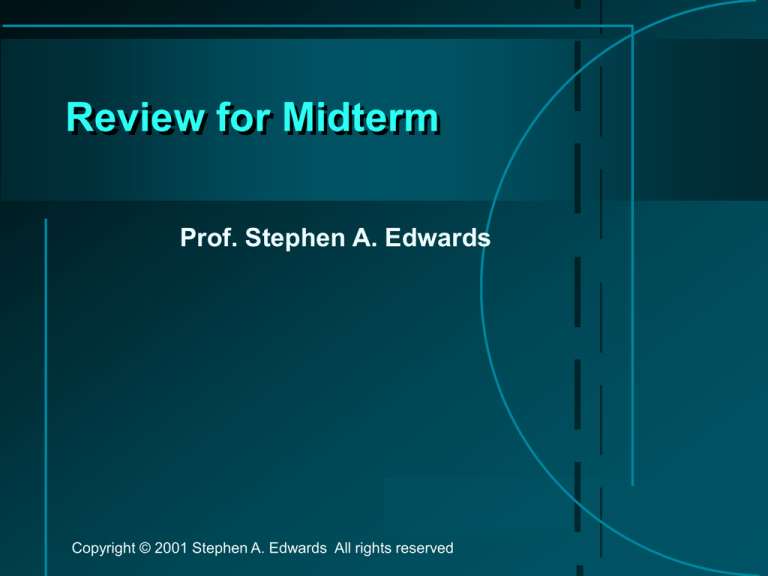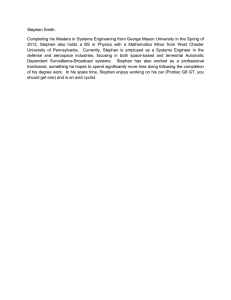
Review for Midterm
Prof. Stephen A. Edwards
Copyright © 2001 Stephen A. Edwards All rights reserved
What Have We Covered?
General Language Issues
Assembly Languages
C
C++
Copyright © 2001 Stephen A. Edwards All rights reserved
General Language Issues
Syntax, Semantics, and Models of Computation
Specification versus Modeling
Concurrency: Two things at once
Nondeterminsm: Unpredictability
Types of communication: Memory, broadcasting
Hierarchy
Copyright © 2001 Stephen A. Edwards All rights reserved
Models of Computation
All languages we have studied thus far use the same
model of computation:
•
Imperative program operating on a memory space
Fetch an instruction
Read its operands
Perform the action
Save the results
Go on to the next instruction
Copyright © 2001 Stephen A. Edwards All rights reserved
Specification and Modeling
How do you want to use the program?
Specification languages say “build this,
please”
Modeling languages allow you to
describe something that does or
will exist
Distinction a function of the model
and the language’s semantics
Copernican Model
of the Solar System
Copyright © 2001 Stephen A. Edwards All rights reserved
Nondeterminism
You simply cannot predict what will happen
No statistical distribution, no expected behavior
It may not work, work for the moment and fail, or
always work
You saw this in the homework assignment
Nondeterministic language allows nondeterministic
programs
Copyright © 2001 Stephen A. Edwards All rights reserved
Assembly Languages
Program a sequence of instructions
Embodies the Von Neumann model of computation:
fetch, read, execute, store
Instructions consist of opcode and operands
Registers and addressing modes
Copyright © 2001 Stephen A. Edwards All rights reserved
CISC Assembly Language
Designed for humans to write
Often fewer, special-purpose registers
Single instruction can perform a lot of work
Two-address instructions (source1, source2/dest)
Difficult to pipeline
Difficult compiler target (hard to model)
Copyright © 2001 Stephen A. Edwards All rights reserved
RISC Assembly Language
Simple, more orthogonal
Three-operand instructions (source1, source2, dest)
More, uniformly-accessible registers
Many have delayed branch instructions
j MyLabel
add R1, R2, R3
% Executed after the jump instruction
sub R2, R3, R4
% Not executed
Copyright © 2001 Stephen A. Edwards All rights reserved
Main DSP Application
Finite Impulse Response filter (FIR)
Can be used for lowpass, highpass, bandpass, etc.
Basic DSP operation
For each sample, computes
z-1
z-1
k
yn =
a x
i
n+i
i=0
a0 … ak are filter coefficients
xn and yn are the nth input and output sample
Copyright © 2001 Stephen A. Edwards All rights reserved
z-1
Traditional DSP Architectures
Multiply-accumulate operation central
Small number of special-purpose registers
Stripped-down datapath to maximize speed, minimize
cost, power
Difficult to program automatically
Specialized instruction-level parallelism
Architecture heavily specialized to application
domain
•
•
•
Complex addressing modes
MAC instruction
Limited zero-overhead loops
Copyright © 2001 Stephen A. Edwards All rights reserved
VLIW Architectures
Next step on the path toward more instruction-level
parallelism
More orthogonal: more costly, but more flexible than
traditional DSPs
Bigger register banks
Simple RISC-like instructions issued in parallel
Multiple, slightly differentiated computational units
Virtually impossible to program by hand
Reasonable compiler target
Copyright © 2001 Stephen A. Edwards All rights reserved
The C Language
High-level assembly for systems programming
Originally used to develop the Unix operating system
Pragmatic language as a result
Stack-frame based mechanism for recursion,
automatic variables
Low-level model of memory inherited from typeless
BCPL
Influenced its view of arrays, pointers
Copyright © 2001 Stephen A. Edwards All rights reserved
C Programs
Collection of Functions
•
•
Recursive
Automatic (local) variables
Functions contain statements
•
Simple control-flow (if-else, for, while, switch)
Statements contain expressions
•
•
Powerful menagerie of operators
Arithmetic, logical, bit-oriented, comparison,
assignment
Copyright © 2001 Stephen A. Edwards All rights reserved
C Types
Based on processor’s natural types
(Actually, a PDP-11’s natural types)
Integers
Floating-point numbers
Bytes (characters)
Funny declarator syntax
•
int (*f)(double, int)
Copyright © 2001 Stephen A. Edwards All rights reserved
C Structs and Unions
Struct:
Way to group objects in memory
Padded to guarantee alignment requirements
Each field given its own storage
Union:
Way to store different objects in the same space
Size equal to size of largest element
Each field stored in the same place
Copyright © 2001 Stephen A. Edwards All rights reserved
Dynamic Memory Management
Malloc() and free() system calls
Maintains a “free list” of available storage
Malloc() locates suitable storage, or requests more
from OS if necessary
Free() release its given area to free list, updates the
data structure
Can be slow and unpredictable
Time/space overhead
Copyright © 2001 Stephen A. Edwards All rights reserved
C Arrays
View left over from BCPL’s typeless view of memory
a[k] is equivalent to a + k (pointer arithmetic)
Thus a[0] is the base of the array
Objects in array simply tiled
Copyright © 2001 Stephen A. Edwards All rights reserved
C Operators
Arithmetic + *
Logical & |
Lazy logical && || (expand to conditional branches)
Pointer arithmetic allowed (from BCPL)
Copyright © 2001 Stephen A. Edwards All rights reserved
setjmp/longjmp
A way to exit from deeply nested functions
#include <setjmp.h>
jmp_buf jmpbuf;
setjmp(jmpbuf);
longjmp(jmpbuf,k);
Stores a jump target
Stores context, returns 0
Jumps back to target in
jmpbuf
Copyright © 2001 Stephen A. Edwards All rights reserved
Setjmp/longjmp
The weird part: longjmp sends control back to the
setjmp call that initialized the jmp_buf
switch (setjmp(jmpbuf)) {
case 0: /* first time */ break;
case 1: /* longjmp called */ break;
}
It’s as if setjmp returns twice
Copyright © 2001 Stephen A. Edwards All rights reserved
Using setjmp/longjmp
#include <setjmp.h>
jmp_buf jmpbuf;
int main(int argc, char *argv[]) {
switch (setjmp(jmpbuf)) {
case 0:
body(); /* Normal program execution */
break;
case 1:
error(“something bad!”);
break;
}
}
Copyright © 2001 Stephen A. Edwards All rights reserved
Using setjmp/longjmp
Where an error occurs
if ( having_trouble )
longjmp(jmpbuf, ERROR_CODE);
Will exit this function as well as others currently
being executed
Does not do any clean-up on the way
Copyright © 2001 Stephen A. Edwards All rights reserved
C++
C with facilities for structuring very large programs
Classes for new data types
Operator overloading for convenient arithmetic
expressions
References for pass-by-name arguments
Inline functions for speed
Templates for polymorphism
Exceptions
Vast standard library
Copyright © 2001 Stephen A. Edwards All rights reserved
Classes
Extension of C struct that binds functions to the
object
Inheritance: adding new fields, methods to an
existing class to build a new one
Object layout model
•
•
•
•
Single inheritance uses a trick
New data members simply tacked on at the end
Can’t remove data members in derived classes
Multiple inheritance more complicated
Copyright © 2001 Stephen A. Edwards All rights reserved
Virtual Functions
Normal methods dispatched by the static type of the
object determined at compile time
Virtual functions dispatched by the actual type of the
object at run time
struct A {
void f();
virtual void g();
};
struct B : A {
void f();
virtual void g();
};
A* a = new B;
a->f();
// calls A::f()
a->g();
// calls B::g()
Copyright © 2001 Stephen A. Edwards All rights reserved
Implementing Virtual Functions
Each object of a class with virtual functions has an
extra pointer to its virtual table
Virtual table has pointers to the virtual functions for
the class
Compiler fills in these virtual tables
Copyright © 2001 Stephen A. Edwards All rights reserved
Const
Way to pass pointers to objects that should not be
modified
void g(char *a, const char *b);
void f(char *a, const char *b) {
*a = ‘a’;
// OK
*b = ‘b’;
// Error: b is const
g(a,a);
// OK: non-const cast to const
g(b,b);
// Error: const b cast to non-const
}
Copyright © 2001 Stephen A. Edwards All rights reserved
Inline
C++ can “inline” function calls: copy the function’s
body to the call site
inline int sum(int a, int b) { return a + b; }
c = sum(5, 6);
is compiled as
c = 5 + 6;
Copyright © 2001 Stephen A. Edwards All rights reserved
FAQs
Do we need to know each assembly language in
detail for the test?
No: I want you to understand the structure of the
assembly languages.
Will the test require writing a big program?
Not a big one, but perhaps a small one.
Are C++ compilers implemented in one pass like C
compilers?
Definitely not. C++ is much too complex. Modern C
compilers make multiple passes, too.
Copyright © 2001 Stephen A. Edwards All rights reserved
Program Size Versus Speed
Not always a direct trade-off
Dumb example:
int sum(int a, int b) {
return a + b;
}
int sum1(int a, int b) {
return a + b;
}
c = sum(5,6) + sum(7,8);
int sum2(int a, int b) {
return a + b;
}
c = sum1(5,6) + sum2(7,8);
Copyright © 2001 Stephen A. Edwards All rights reserved
Maybe not so dumb
Template <class T> sort(int size, T* array) { … }
char *c[10];
sort<char *>(10,c);
float *c[10];
sort<float *>(10,c);
Each call of sort will generate a distinct, identical
copy of the code for sort
Copyright © 2001 Stephen A. Edwards All rights reserved


